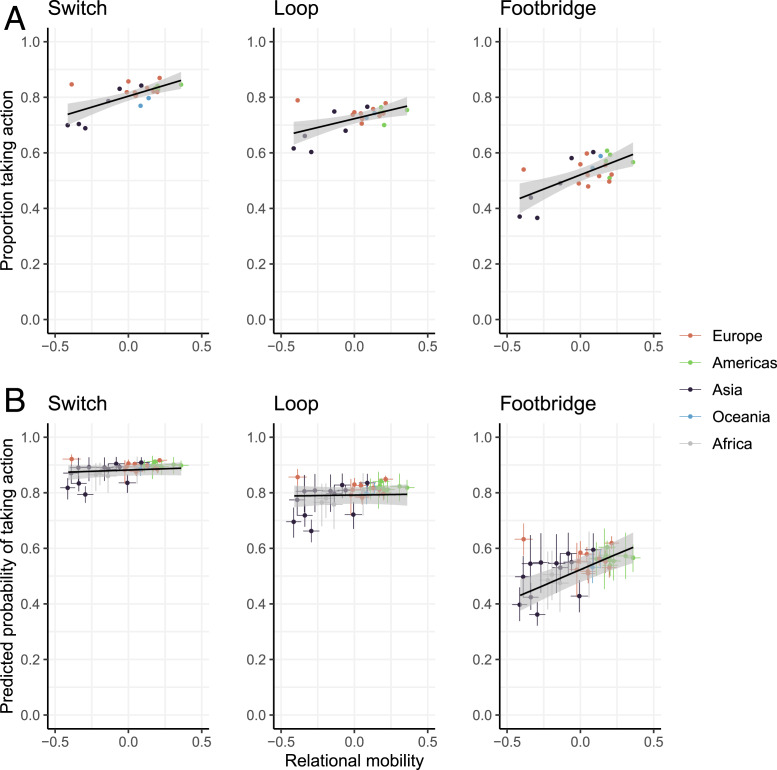Variants of the “trolley problem” present moral dilemmas in which one must choose whether to sacrifice one person to save many (1). Recently, Awad et al. (2) claimed that people in countries with lower relational mobility are more likely to reject sacrificial decisions in the trolley problem. Relational mobility refers to the fluidity with which people can foster new relationships (3). However, the country-level analyses Awad et al. report (2) (Fig. 1A) do not account for two important factors. First, the analyses do not account for Galton’s problem: nonindependence between countries attributable to shared cultural ancestry and/or geographic proximity (4). Controlling for such dependencies can reduce or remove putative cross-cultural associations (5). Second, the analyses do not account for measurement error on the country-level sacrificial probabilities or relational mobility latent variable averages. Ignoring measurement error can inflate regression coefficients (6).
Fig. 1.
Association between relational mobility and decisions in the three trolley problem variants from (A) the separate country-level regressions by Awad et al. (2) (n = 23 countries) and (B) our Bayesian multilevel logistic regression using the complete dataset (n = 182,780 decisions). This model accounts for geographic and linguistic distance between countries and incorporates measurement error on both the country-level probability of taking action (95% credible interval represented as vertical lines around points) and the country-level relational mobility variable (± 1 SE represented as horizontal lines around points). Lines reflect posterior median regression lines, and shaded areas reflect 95% credible intervals. We found no relationship between relational mobility and sacrificial behavior in the Switch and Loop dilemmas, although the positive relationship was robust in the Footbridge dilemma.
Thankfully, Awad et al. (2) made their data publicly available (7), allowing researchers to run robustness checks. Leveraging the complete individual-level dataset of 182,780 decisions, we conducted a Bayesian multilevel logistic regression with sacrificial decision as the outcome variable. As predictors, we interacted dilemma variant (Switch, Loop, or Footbridge) with country-level relational mobility. We included random intercepts for individuals and random intercepts for countries that covaried according to geographic and linguistic distance (see https://osf.io/qxjvh/). Country-level measurement error was accounted for by modeling random effects (for sacrificial probabilities) and by incorporating SEs (for relational mobility). This allowed us to include countries below the threshold of 200 decisions per variant and country set by Awad et al. (2). Analyses were conducted in R v3.6.1 (8) using the brms package (9). Data, code, and fitted models can be found at https://osf.io/qxjvh/ (10).
In contrast to Awad et al. (2), we found no relationship between sacrificial behavior and relational mobility for the Switch or Loop variants (Fig. 1B). The log-odds slope was 0.18, 95% CI [−0.21, 0.57] in the Switch dilemma and 0.04 [−0.35, 0.43] in the Loop dilemma, though the relationship remained positive in the Footbridge dilemma (0.91 [0.53, 1.29]). This result held when separately controlling for gross domestic product, individualism, and religiosity. Awad et al. (2) also argue that the relationship between sacrificial behavior and relational mobility is driven primarily by Asian countries; however, analyzing only Asian countries (n = 14,957) removes any (positive) relationship across all three variants, contradicting this explanation.
Our finding that lower relational mobility predicts rejection of sacrifice only in the Footbridge dilemma is critical to understanding the effects of relational mobility on sacrificial behavior. Unlike the Switch and Loop dilemmas, the Footbridge dilemma involves the use of personal force. If, as Awad et al. (2) suggest, rejecting sacrificial behavior has increased signaling value in cultures low in relational mobility, it is not clear why this should only apply when personal force is used. One possibility is that inflicting the unambiguous insult of personal force is riskier for individuals from a population with low relational mobility. Our revised analysis highlights the importance of controlling for nonindependence and measurement error when analyzing population-level differences in human behavior.
Footnotes
The authors declare no competing interest.
Data deposition: Data, code, and fitted models are available from the Open Science Framework repository at https://osf.io/qxjvh/.
References
- 1.Foot P., The problem of abortion and the doctrine of the double effect in virtues and vices. Oxford Rev. 5, 5–15 (1967). [Google Scholar]
- 2.Awad E., Dsouza S., Shariff A., Rahwan I., Bonnefon J.-F., Universals and variations in moral decisions made in 42 countries by 70,000 participants. Proc. Natl. Acad. Sci. U.S.A. 117, 2332–2337 (2020). [DOI] [PMC free article] [PubMed] [Google Scholar]
- 3.Thomson R., et al. , Relational mobility predicts social behaviors in 39 countries and is tied to historical farming and threat. Proc. Natl. Acad. Sci. U.S.A. 115, 7521–7526 (2018). [DOI] [PMC free article] [PubMed] [Google Scholar]
- 4.Naroll R., Two solutions to Galton’s problem. Philos. Sci. 28, 15–39 (1961). [Google Scholar]
- 5.Bromham L., Hua X., Cardillo M., Schneemann H., Greenhill S. J., Parasites and politics: Why cross-cultural studies must control for relatedness, proximity and covariation. R. Soc. Open Sci. 5, 181100 (2018). [DOI] [PMC free article] [PubMed] [Google Scholar]
- 6.McElreath R., Statistical Rethinking: A Bayesian Course with Examples in R and Stan (CRC Press, Boca Raton, FL: ) 2016). [Google Scholar]
- 7.Awad E., Dsouza S., Shariff A., Rahwan I., Bonnefon J. F., Data from “Classic trolley - moral machine website. Open Science Framework. https://bit.ly/2Y7Brr9. Accessed 21 January 2020.
- 8.R Core Team , R: A Language and Environment for Statistical Computing (R Foundation for Statistical Computing, 2018). [Google Scholar]
- 9.Bürkner P.-C., brms: An R package for Bayesian multilevel models using Stan. J. Stat. Softw. 80, 1–28 (2017). [Google Scholar]
- 10.Claessens S., Kyritsis T., Atkinson Q. D., Revised analysis shows relational mobility predicts sacrificial behavior in Footbridge but not Switch or Loop trolley problems. Open Science Framework. https://osf.io/qxjvh/. Deposited 22 January 2020. [DOI] [PMC free article] [PubMed]



